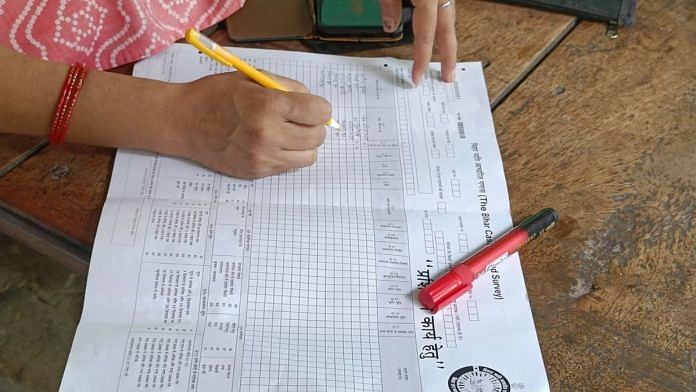Why then this volte face by my party? Described as a “surgical strike on the opposition”, the decision to include caste in the census has been directed at the opposition parties, who have been long demanding a caste census.
Throughout the history of Independent India, the Congress party has played divisive politics in some form or the other—whether by dividing on the basis of religion, promoting language-based politics in the South, or now, using caste as a poll plank. Rahul Gandhi’s Congress seems to be following in the footsteps of the Muslim League’s pre-Partition ideals.
Rather than focusing on development and prosperity for all, Gandhi started clamouring for a caste census during his so-called Bharat Jodo Yatra, which was a ‘Bharat Todo Yatra’ in disguise. He claimed that caste enumeration was “essential for deepening social justice,” but the real aim appeared to be redistribution of wealth as promised during the 2023 elections.
In a modern, progressive India, are we really focusing on caste? Do we ask the caste of the delivery person bringing us food in one of Zomato’s 800 connected cities? Does the caste of a Swiggy delivery partner matter to the speed and efficiency with which our groceries arrive in 660 cities?
As we near the centenary of India’s independence in 2047, the government has set a goal of achieving ‘Viksit Bharat’—a Developed India. This vision cannot be realised if a substantial chunk of the population is left behind due to poverty, economic disparity, and social discrimination.
While in theory the BJP doesn’t believe that caste should be relevant in a developed India, this principle was adequately exemplified at the recent Mahakumbh, where over 66 crore people took a divine dip in the same waters of the holy rivers—irrespective of caste.
Now, Rahul Gandhi, Leader of the Opposition wants to take credit for the BJP’s inclusion of caste in the next census. I would like to ask Gandhi: which cast does he identify with, given that his father was Parsi and his mother is Catholic? Caste, after all, is a tenet of the Hindu faith.
चातुर्वर्ण्यं मया सृष्टं गुणकर्मविभागश: |
तस्य कर्तारमपि मां विद्ध्यकर्तारमव्ययम् ||
Verse 4.13 of the Bhagavad Gita expostulates Krishna’s stance on caste: that one’s own guna (qualities) and karma (actions) should determine one’s occupation—not heredity.
While the Manusmriti justifies the caste system as the basis of regularity and order in society, nowhere does it explicitly say or imply that the caste system is inherited.
Scholars argue that until the 18th century, caste system was more flexible. People could move between castes. It was during British colonial rule that caste rigidities were formalised to suit the divide-and-rule policies of the colonial state.
The Constitution of India, primarily drafted by Dr BR Ambedkar, recognises that all Indians are equal irrespective of caste. Further, reservation in higher educational institutions and government services was mandated for Scheduled Castes and Scheduled Tribes to ensure that the injustices of centuries in education and social development were countered and reversed.
In the 1990s, the country erupted with protests against the implementation of the Mandal Commission recommendations—reserving 27 per cent of central government jobs and educational seats for Other Backward Classes (OBCs). This marked a watershed in India’s caste politics.
The idea of ‘creamy layer’ within OBCs was introduced to ensure that the most backward sections get the benefit of reservations, implemented through the Indra Sawhney judgement of 1992.
PM Modi’s government is committed to the ideals of Sabka Saath, Sabka Vikas, Sabka Vishwas, Sabka Prayaas; and to this extent, the government is working to ensure all the basic necessities to the marginalised and the poor, an inclusive and equitable development for all through programmes like Pradhan Mantri Awas Yojana, Jan Dhan, Jal Jeewan Mission, PM Kisan, etc.
An audit is needed to understand how the affirmative action schemes of the past 75 years can be tailored to actually benefit the real marginalised. Unlike the past governments, the Modi government actually has a plan for “Garibi hatao”.
There has been no policy shift in opting to include caste in the next census. Believe me, it has nothing to do with upcoming Bihar elections, rather it is an effort by the government to ensure that Sabka Vikas happens with Sabka Saath, and no one is left behind.
The Congress party’s approach to welfare schemes focused on doles without being mindful of its economic impact. Examples of such measures can be witnessed in Himachal Pradesh and Karnataka.
The BJP, on the contrary, has focused on fiscal deficit, state budgets, availability of resources for infrastructure development and providing an enabling ecosystem for flourishing economies. Examples of this model of governance can be seen in states like Haryana and Madhya Pradesh.
Similarly, Congress’s intent and pursuit of caste is to enhance the caste divide in the name of affirmative action to ensure religion-based reservation. Rahul Gandhi has never talked about sub-categorisation of Hindu castes to determine actual backwardness. The Congress’ narrative has been built around affirmative action, equity, and wealth redistribution to seek religious reservation, which was sought in Andhra Pradesh in 2011 elections and has been struck down repeatedly by the courts.
The BJP’s intent, in contrast, was made clear with the 127th Amendment to the Constitution in 2021, which enabled states to identify sub-categories within OBC’s. Thus, the BJP is seeking a rejig within the OBC category without changing the existing parameters provided by the scheme laid out in various Supreme Court judgments. In the past, the Court has laid out a scheme—also known as the triple test—which seeks:
1. A dedicated commission at the state level to determine the number of people covered under various categories; thus, a census.
2. Proportional representation of various categories, i.e., sub-categories or sub-castes; thus, a caste-based census.
3. Reservation cannot exceed 50%, including all categories.
There is a fundamental difference between Rahul Gandhi-led Congress’ approach and that of Modi-led BJP. The former seeks religion-based reservation, excluding caste-based reservation in institutions run by minority communities. Through this piece, I wish to inform readers that the Rahul Gandhi-led Congress Party’s flawed policy has been to create a religious sub-quota within the backward communities or to seek extra reservations. This approach is further supported by evidence that, in 2011–12, the Congress brought in the following changes:
1. Waqf Amendment
2. Communal Violence Bill
3. Minority sub-quota at the cost of the OBC quota
These aren’t isolated instances of policy review; rather, they reflect the long-term policy objectives rooted in the political philosophies of various parties. The BJP hasn’t flipped but is working towards reaching out to the marginalised.
Jitni abadi utna haq, caste census, and reservation in private sector demand will haunt the Congress party as India moves towards a $10 trillion economy. Caste will become obliterated due to private wealth creators, hysteria over lack of government jobs will vanish, and private institutions will become contributors to the greater good. India’s young population will join the system as employers or employees. The scions of Congress party will regret the bad politics played by their ancestors unlike others who could take pride in the acts of their ancestors for leaving their caste identity and remaining proud of their Indian identity while being known as practising Hindus.
Meenakshi Lekhi is a BJP leader, lawyer and social activist. Her X handle is @M_Lekhi. Views are personal.
(Edited by Prashant)








